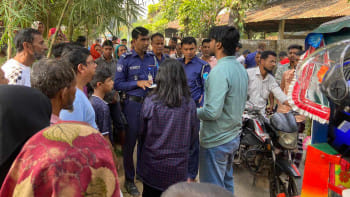The mother of Chotti Munda

"I think a creative writer should have a social conscience. I have a duty toward society. . . This sense of of duty is an obsession, and I must remain accountable to myself."
-Mahasweta Devi
The above lines are from an interview with Gayatri Chakravorty Spivak published as an introduction to Imaginary Maps, a translated collection of three stories by Mahasweta Devi. And, indeed, very few writers, with their corpus of work, have embodied the social and political nature of literature, and a writer's life-long devotion to a cause as has Mahasweta Devi. For this reason, India and Bangladesh, her country of birth, mourn her death - it's the passing of a symbol of courage and craft, of a confluence of art and journalism.
Born in Dhaka in 1926, Mahasweta Devi was from a family of artists: her father was the poet Manish Ghatak, and her mother Dharitri Devi, a writer and social worker, and her uncle was the filmmaker Ritwik Ghatak. Much more has been written, especially since her death due to cardiac arrest last Thursday, of the family's influence on her life - but what interests me is how she was remembered. 'Voice of the dispossessed' read one headline, while another called her the 'Voice of the subaltern.'
Apt, yes, but I feel that she would object to being called the voice of the indigenous communities she worked with almost all her life. Unlike the British first, and then Indian governments through the ages, Mahasweta Devi truly loved and trusted the tribals she worked with. There was nothing inherent in them to make them 'less developed', and it was their continuous exploitation that had resulted in them being pushed to the margins. She believed that these communities could bring about change themselves. "Let them know their rights, and let them stand up and fight for them. Their involvement is an amazing experience," she said in the same interview with Spivak.
It's little wonder then that she did not believe in monetary aid being of much use to bring about meaningful change to years and years of exploitation. Her approach was completely different, one that would take her to the heart of their sufferings, living among them, and sharing in their stories and songs. Her novel Hajar Churashir Maa (Mother of 1084) set in the backdrop of the Naxalite Revolution in India, is as much a story about politics, as it is about the humane.
It would be difficult to do justice to the large body of work she leaves behind. For me, they remain an essential part of understanding the history of indigenous and tribal India and Bangladesh. One could read hundreds of history books on the Santhal rebellion or the Munda rebellion, but to get a glimpse of the lives of these people, their thoughts, aspirations, and how administration after administration had failed them, deceived them, one need only read her novels. Chotti Munda Ebong Tar Teer (Chotti Munda and His Arrow) is the most moving portrait of the systematic exploitation of the Munda tribe in India, while Aranyer Adhikar (Occupation of the Forest) tells the story of Birsa Munda, the Indian tribal freedom fighter, who died in jail, and whose portrait now hangs in the Indian Parliament.
Despite official recognitions of the rights of the indigenous and tribals, Mahasweta Devi believed that the governments over the years had failed in proper rehabilitation of the tribals. She once said that government officials were afraid of what she would write next. Mahasweta Devi would send them letters over and over again to campaign for the cause of the communities she fought for. She would work for newspapers and write reports about bonded labour, eviction, and the flip side of development and economic marginalisation. She herself believed that her journalistic exposure from living among the tribal and indigenous people helped her. She would go on to aid them in uniting for their political ends, helping them with a programme and platform to voice their grievances and demand their rights. In 1986, she formed the Adim Jati Aikya Parishad (Tribal Unity Forum) with the aim to collectively mobilise these communities, to undo what the British had started by setting these communities against each other.
Mahasweta Devi was a woman defined by her courage to speak the truth to establishment. She stood for her cause and devoted her life for the rights of tribal and indigenous communities. The hardships, exploitation and marginalisation she wrote about are still a big part of Bangladesh and India, and therefore, in remembering her, let us remember her work. And, that it is still to be completed.
The writer is a member of the editorial team, The Daily Star.


 For all latest news, follow The Daily Star's Google News channel.
For all latest news, follow The Daily Star's Google News channel. 



Comments